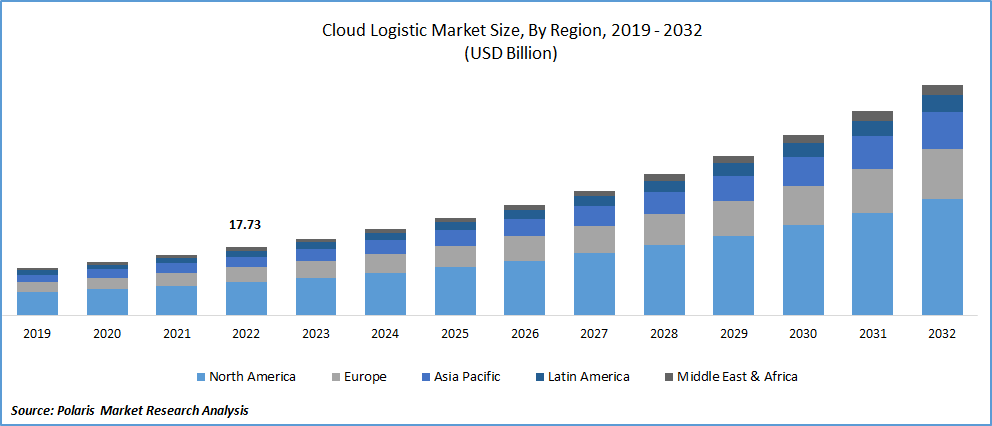
Cloud Logistics Market Share, Size, Trends, Industry Analysis Report, By Type, By OS Type, By Enterprise Size (Large Enterprises, SMEs), By Industry Vertical, By Region, And Segment Forecasts, 2023 - 2032
- Published Date:Oct-2023
- Pages: 115
- Format: PDF
- Report ID: PM3817
- Base Year: 2022
- Historical Data: 2019-2021
Report Outlook
The global cloud logistics market was valued at USD 17.73 billion in 2022 and is expected to grow at a CAGR of 13.0% during the forecast period.
The widespread adoption of cloud-based business operations has triggered a digital transformation in the supply chain industry, resulting in market growth. This shift allows the industry to manage fluctuations better and rapidly changing demands, enhancing its ability to respond to disruptions in the supply chain. Organizations are reconfiguring their supply chains into digital networks, effectively combining physical product & service flows. It offers cost-efficient, secure, & highly adaptable solutions that seamlessly integrate with current systems.

To Understand More About this Research: Request a Free Sample Report
The adoption of cloud computing in the logistics sector provides several critical advantages, such as reducing downtime, ensuring continuous business operations, and mitigating the risk of data loss. These benefits are of paramount importance because downtime can lead to significant revenue losses and damage a company's reputation. As a result, many logistics firms are embracing cloud logistics to harness the benefits that cloud computing offers to their activities.
The market faces obstacles primarily due to limited structural control and unauthorized usage. Employee negligence is a significant contributor to security breaches, as they may resort to unverified and unauthorized methods to access cloud servers, potentially causing harm to the entire logistics and supply chain system. Nevertheless, the integration of artificial intelligence (AI) into cloud logistics is expected to open doors for market expansion in the forecast period. Furthermore, the increasing adoption of AI-driven innovations and the rising costs associated with manual labor are driving the logistics industry towards AI adoption, resulting in improved integrated operations.

For Specific Research Requirements, Request for a Customized Report
Growth Drivers
Easily adapt to changing business needs.
One of the primary drivers fueling the growth of the Cloud Logistics Market is its exceptional ability to easily adapt to changing business needs. In today's dynamic and rapidly evolving supply chain landscape, companies face a multitude of challenges and uncertainties. Cloud-based logistics solutions offer a flexible and scalable platform that empowers businesses to respond to these changes swiftly.
These solutions enable companies to quickly adjust their logistics processes, whether it's accommodating fluctuating demand, integrating new supply chain partners, or optimizing routes and schedules. The cloud provides the agility necessary to seamlessly scale operations up or down in response to market shifts, all without the extensive time and resources traditionally required for on-premises infrastructure changes.
Moreover, the scalability of cloud logistics is particularly advantageous for businesses experiencing growth or expansion. It ensures that logistics operations can easily grow in tandem with the organization's needs, preventing bottlenecks and disruptions. This adaptability not only enhances operational efficiency but also contributes to cost savings and improved customer satisfaction, making cloud logistics a critical driver in today's competitive market.
Report Segmentation
The market is primarily segmented based on type, OS type, enterprise size, Industry Vertical, and region.
|
By Type |
By OS Type |
By Enterprise Size |
By Industry Vertical |
By Region |
|
|
|
|
|
To Understand the Scope of this Report: Speak to Analyst
By Type Analysis
The public segment accounted for the largest market share in 2022
The public segment held the largest revenue share in 2022. A public-based cloud refers to an IT infrastructure in which a third-party provider oversees and provides on-demand computing resources and infrastructure through the Internet. These services are available to a wide range of companies and individuals who can lease them with flexibility, including choices such as IaaS, PaaS, & SaaS. Payment can be structured on either a monthly basis or a pay-per-use model.
The private segment will grow at a rapid pace. This growth is attributed to a heightened emphasis on data security. Additionally, the rising adoption of private cloud solutions has given rise to a variety of vendors providing such solutions to government agencies.
By OS Type Analysis
Web-based segment held a significant market share in 2022.
Web-based segment held the majority market share in 2022. Software is designed to streamline and enhance various aspects of logistics management, including transportation, inventory control, order tracking, and supply chain coordination. This software is accessible and operable via the internet through a web browser. It empowers users to access and manage logistics data and operations from anywhere with internet connectivity, providing greater convenience and flexibility in logistics management. Additionally, web-based logistics software often offers real-time tracking and reporting features, facilitating more informed decision-making and improving overall logistics efficiency.
Native OS will grow at a substantial pace. Unlike traditional software retrofitted for cloud usage, native logistics software is developed from the ground up to harness the benefits of cloud computing fully. Additionally, this type of software is engineered to take advantage of key cloud technologies, including scalability, flexibility, and resilience. Native logistics software can automatically adapt its computing resources to accommodate fluctuating workloads, ensuring efficient handling of changing demands.
By Industry Vertical Analysis
The retail segment held the largest share in 2022.
The retail segment garnered the largest share in 2022. Cloud logistics is delivering substantial advantages to the retail sector on various fronts. These benefits include cost savings by reducing infrastructure, storage, and computing costs, all while providing instant access to critical operational and inventory information. Consequently, cloud logistics is driving a complete revolution in the retail industry, resulting in more efficient inventory control, heightened data security, improved user experiences, greater profitability, and enhanced disaster management capabilities.
The healthcare segment will grow at a rapid pace. These solutions offer real-time insights into the healthcare supply chain, enabling medical facilities to oversee medical equipment, medications, and other supplies, as well as monitor inventory levels. This enhanced visibility plays a crucial role in preventing stock shortages and ensuring consistent availability of critical medical resources. Additionally, cloud platforms prove highly advantageous for managing pharmaceuticals and cold chain logistics, ensuring the proper storage and transportation of temperature-sensitive drugs and vaccines.
Regional Insights
The Asia Pacific region is expected to experience the highest growth rate during the projected period.
Asia Pacific will grow at a rapid pace. Cloud logistics has seen swift adoption in the region, reshaping supply chain and warehouse management practices across various industries. This dynamic and diverse market has embraced cloud-based solutions to address challenges and harness the advantages of cloud-based supply chains. Additionally, the region has witnessed substantial growth in e-commerce and digital transformation. Cloud platforms have played a pivotal role in supporting the expansion of e-commerce businesses by facilitating seamless order processing, fulfillment, and last-mile delivery.
Key Market Players & Competitive Insights
These manufacturers have incorporated new product launches as a central strategy to expand their market presence. These capabilities have been developed to enhance supply chain operations, leading to better performance and cost-efficiency throughout the supply chain. Through the utilization of these innovations, customers can attain greater operational efficiency, cost reductions, and enhanced value in the management of their logistics and supply chain activities.
Some of the major players operating in the global market include:
- 3GTMS
- BluJay Solutions
- Bwise
- C. H. Robinson
- CargoSmart Limited
- Cleo
- Descartes Systems Group
- Fleetio
- IBM Corporation
- Inaccurate
- MetricStream, Inc.
- Microsoft Corporation
- Oracle Corporation
- Orderful
- SAP SE
- ShipBob, Inc.
- Thomson Reuters Corporation
- Transplace (an Uber Freight Co.)
- Trimble Transportation
Recent Developments
- In February 2022, Oracle Corporation introduced upgraded logistics features that empower its customers to enhance supply chain efficiency and overall value. These fresh capabilities have been developed with the aim of optimizing supply chain operations.
- In November 2022, Microsoft introduced the Microsoft Supply Chain Platform, which represents an innovative design approach aimed at improving supply chain agility, automation, and sustainability. This new platform is set to transform supply chain operations, empowering businesses to achieve greater flexibility, efficiency, and environmental sustainability in their logistics and supply chain activities.
Cloud Logistics Market Report Scope
|
Report Attributes |
Details |
|
Market size value in 2023 |
USD 19.99 billion |
|
Revenue forecast in 2032 |
USD 59.85 billion |
|
CAGR |
13.0% from 2023 – 2032 |
|
Base year |
2022 |
|
Historical data |
2019 – 2021 |
|
Forecast period |
2023 – 2032 |
|
Quantitative units |
Revenue in USD billion and CAGR from 2023 to 2032 |
|
Segments covered |
By Type, By OS Type, By Enterprise Size, By Industry Vertical, By Region |
|
Regional scope |
North America, Europe, Asia Pacific, Latin America; Middle East & Africa |
|
Customization |
Report customization as per your requirements with respect to countries, region and segmentation. |
FAQ's
The cloud logistics market report covering key segments are type, OS type, enterprise size, Industry Vertical, and region.
Cloud Logistics Market Size Worth $59.85 Billion By 2032 | CAGR: 13.0%.
The global cloud logistics market is expected to grow at a CAGR of 13.0% during the forecast period.
Asia Pacific is leading the global market.
key driving factors in cloud logistics market are Enhanced supply chain monitoring and management.
